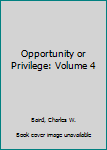Opportunity or Privilege: Volume 4
Since the 1930s the United States has had a labor market that is heavily regulated. Wages are at least partially controlled by government imposed minimum wage laws. Laborers in most states are required to join unions in factories where they exist or else lose the opportunity of working there. Furthermore, both employers and employees lack the freedom to negotiate contracts on an individual basis when they are subject to compulsory unionism. Economist Charles Baird conducts an exhaustive examination of the history of labor legislation in the United States. He argues that a labor market premissed on the natural rights of individuals and voluntary exchange would prove both more just to everyone involved in the labor market and more economically efficient. In such a free market system, labor unions would have a place, for individuals would retain their rights to form any coalitions they might choose, but they would be deprived of the power of coercing nonunionized workers or management. Compulsory unionism, which affords unearned, monopoloy windfalls to some workers at the cost of the majority of nonunionized labor would cease to exist. Every worker would receive what he or his voluntary union could achieve through free bargaining.
Format:Hardcover
Language:English
ISBN:113852932X
ISBN13:9781138529328
Release Date:January 2021
Publisher:Routledge
Length:97 Pages
Customer Reviews
0 rating





